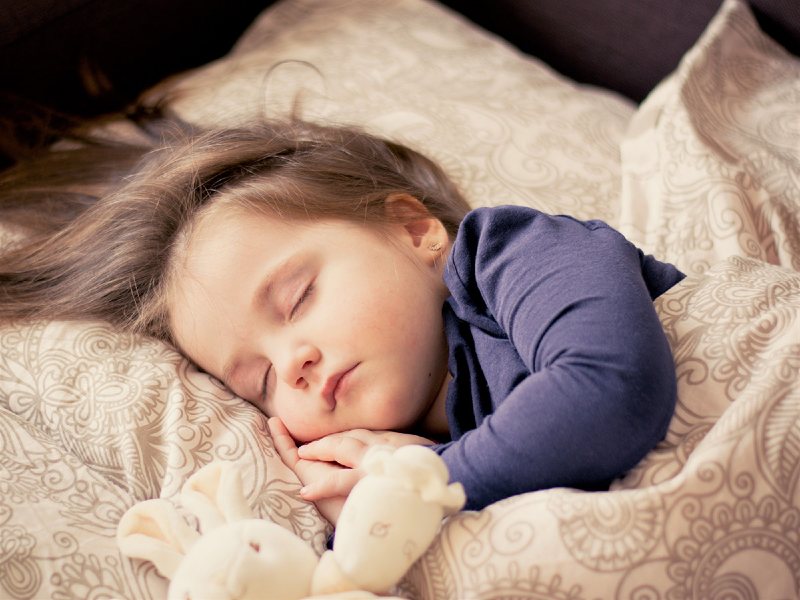
It is no question that sleep changes our day, especially restorative sleep. Sleep contributes to our mood, performance, outlook, safety, and levels of stress and anxiety. We are more relaxed (and more pleasant to be around!) after we have a decent amount of sleep. Sleep is magical, and we often notice with the more sleep we get, the more we feel we can take on the day.
It is pretty evident that sleep has a distinct effect on our daily lives when it comes to more than just our perspectives and attitudes. Sleep has also been known to cause bias with our memory. We tend to focus more on negative events and continue to build up space for those negative moments in our life with less sleep.
We know exactly how these situations play out. There are nights where your child did not sleep well, neither of you did. Sometimes we start our days exhausted, or with a cloudy mind from lack of sleep. We instantly reach for the coffee and try to take on the day. You aren’t alone, and this does happen with more than others. You may have asked yourself questions, or tried to find answers online on what you can do to improve these issues.
We should keep in mind that if we did not get enough sleep the night before, we may be misinterpreting the facts of that night and next day.
A recent study in Finland has been published by Pediatrics that explains why parents who do not sleep well may mistakenly assume their children did not either. In this study researchers studied 100 two to six year olds and their parents sleep patterns. The children wore bracelet devices called actigraphs. These devices are able to track the movement and quantify sleep, and were worn for a week to estimate sleep quality and duration. The parents were made to keep a sleep diary for their children and filled out a sleep questionnaire. The study did include the parents’ age, education, and other relevant variables. This study also included the child’s age, chronic illnesses, gender, medication, and number of siblings.
Marko Elovainio, the author of the Pediatrics study, stated, “People who sleep poorly overestimate their children’s sleep problems.”
Parental sleeping problems correlated to frequent reports by parents of children’s sleeping problems. However, readings from the children’s actigraph bracelets did not support parents’ perceptions. Translation: parents who didn’t sleep well exaggerated the sleep problems of their children.
The sleep issues of the parents correlated with the frequent reports by the parents expressing their children’s sleeping problems. However, the actigraph readings did not support the perceptions of the parents. This translates to parents sleep problems being exaggerated by the sleep problems of their children.
In the past, previous studies have shown that people who are tired are more likely to remember and experience negative events and details. With this small study it seems to have confirmed these previous studies. There is no questions that is makes sense when parents do not sleep well they could possibly be more attuned to a child’s challenges.
Misplaced interventions with children’s sleep difficulties could be a consequence of tired parents.
It is obvious that sleep is important for children and parents. In many practices it is very common see families putting their child’s sleep over their own. It is important to think about the well-being of the family as a whole. As our babies grow into children, we learn to improve and prioritize our sleep patterns. With a good night of sleep we are able to accomplish more in a more productive manner.
When we have issues in our home we often reach of to people we trust, and our health care providers. If you do reach out to your child’s pediatrician about their sleep, make sure you are taking into consideration the sleep of everyone in the home. As researchers have concluded, “In the clinical field, it is of paramount importance to aim interventions in a child’s sleeping difficulties toward the well-being of the whole family instead of only the child….Tired parents can unconsciously exaggerate their child’s sleeping difficulties which could lead to misplaced interventions.“
When a child is diagnosed and treated for poor sleep it is often based off of what the parents are reporting. Make sure you recognize if your sleep habits are connected with your child’s.
Turn off all screens 1 hour before bed, including smart phones or tablets. With light emanating so close to our face, it is potentially interfering with our naturally occurring melatonin spike before we sleep. Stimulation from texts, gaming, or scrolling through social media sites can deter us from falling asleep quickly.
It is understandable that sleep can vary between individuals. However, there is a general guideline that should be followed:
- You children need roughly 11-13 hours of sleep.
- School-age children should have 9-10 hours of sleep.
- Teens average about 8 1/2- 9 1/2 hours of sleep.
- For adults. the Sleep Foundation states at least 7-8 hours of sleep.
If you have concerns about your child’s sleep (or how it is affecting your own), reach out to your pediatrician at MacKoul Pediatrics. You can reach us at (239) 573-2001.
MacKoul Pediatrics is an amazing local pediatrics office in Cape Coral, FL where caring, compassionate doctors and nurses work with you to keep your children as healthy as possible. MacKoul cares for children from birth to college age, from Cape Coral, Fort Myers, Naples, and beyond.
June 12, 2017
 It is no question that sleep changes our day, especially restorative sleep. Sleep contributes to our mood, performance, outlook, safety, and levels of stress and anxiety. We are more relaxed (and more pleasant to be around!) after we have a decent amount of sleep. Sleep is magical, and we often notice with the more sleep we get, the more we feel we can take on the day.
It is no question that sleep changes our day, especially restorative sleep. Sleep contributes to our mood, performance, outlook, safety, and levels of stress and anxiety. We are more relaxed (and more pleasant to be around!) after we have a decent amount of sleep. Sleep is magical, and we often notice with the more sleep we get, the more we feel we can take on the day.